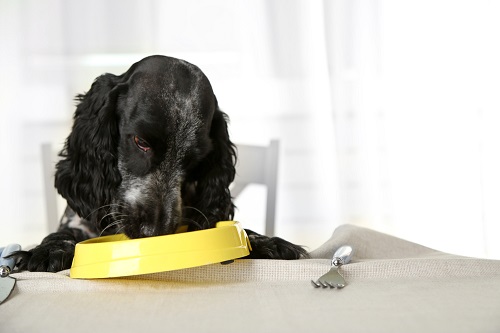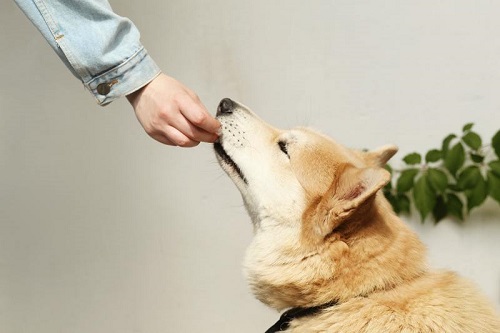Can Dogs Eat Sunflower Seeds? Would it be a good idea to give them as a treat to your pooch every now and then? Time to find out.
Sunflower seeds are a popular snack for humans, but can our canine companions join in on the crunchy fun? Let’s know the answer to Can Dogs Eat Sunflower Seeds?
What Are Sunflower Seeds?

Sunflower seeds are the edible seeds of the sunflower plant, which is scientifically known as Helianthus annuus. The seeds are usually roasted or raw and are commonly used as a snack or ingredient in various foods.
Sunflower seeds come in various flavors and can be enjoyed plain or seasoned with various spices, making them a versatile and tasty snack.
Can Dogs Eat Sunflower Seeds?
So, Can Dogs Eat Sunflower Seeds? Yes, they can!
Remember that sunflower seeds are high in fat and may cause digestive issues and blockages in dogs if eaten in large amounts. Always consult a veterinarian before introducing new food to your dog’s diet and to determine the appropriate serving size. While dogs can eat sunflower seeds, it’s essential to practice caution.
Health Benefits of Sunflower Seeds
Before you ask, Can Dogs Eat Sunflower Seeds, they can provide a number of health benefits to dogs when fed in moderation. Some of these benefits include:
- Rich in nutrients: Sunflower seeds are a good source of protein, healthy fats, vitamins, and minerals, including vitamin E, selenium, and magnesium. These nutrients can help support a dog’s overall health and wellness.
- Supports skin and coat health: The healthy fats and vitamin E found in sunflower seeds can help maintain healthy skin and coat, reducing the risk of skin problems and promoting a shiny coat.
- Aids in digestion: The fiber in sunflower seeds can help regulate digestion, promoting a healthy digestive system and reducing the risk of digestive issues.
- Antioxidant properties: Sunflower seeds contain antioxidants, which can help protect against damage from harmful free radicals, reducing the risk of chronic disease.
A Few Health Concerns
Eating too many sunflower seeds or sunflower products can lead to health hazards in dogs, including digestive issues, weight gain, and blockages in the digestive tract.
Sunflower seeds are high in fat, which can cause digestive upset and pancreatitis if consumed in large quantities. Additionally, the shells of sunflower seeds can cause blockages in the digestive tract if swallowed and can also be a choking hazard.
How to Feed Sunflower Seeds to Your Dog

Before you ask, Can Dogs Eat Sunflower Seeds, here are some tips on how to feed sunflower seeds to your dog:
- Remove the shells: The shells of sunflower seeds can cause blockages in the digestive tract if swallowed, so it is important to remove them before feeding sunflower seeds to your dog.
- Serve in moderation: Sunflower seeds are high in fat, so it is best to give them to your dog in moderation. Always consult with a veterinarian to determine the appropriate serving size for your pet.
- Consider the source: When purchasing sunflower seeds for your dog, look for high-quality, unsalted, and unshelled ones. Avoid roasted seeds in oils or seasoned with salt, as these can be harmful to dogs.
- Mix with food: Mix them well with your dog’s regular food, or they can be offered as a treat. Make sure to supervise your dog while they are eating sunflower seeds to ensure they do not choke or swallow the seeds whole.
- Store properly: Store sunflower seeds in an airtight container in a cool, dry place to prevent spoilage and maintain their freshness.
How Much Sunflower Seeds is Ok for Dogs?
The amount of sunflower seeds appropriate for dogs depends on several factors, including their size, age, and health. Approximately it should be 10-20 seeds for small dogs and 20-40 for big dogs in a week. It is best to consult with a veterinarian to determine the appropriate serving size for your pet, as they can consider your dog’s individual needs and provide a personalized recommendation.
As a general guideline, sunflower seeds should only make up a small portion of your dog’s overall diet, and they should never replace a balanced, nutritionally complete diet.
Can Dogs Have Sunflower Oil?
Yes, dogs can have sunflower oil, should be given in moderation as it is high in fat. Sunflower oil is a source of healthy fats that can support a dog’s overall health, but overfeeding can cause digestive issues and weight gain. Give high-quality, cold-pressed, and unrefined oil, and avoid chemically processed oils or those with added preservatives.
Store sunflower oil in a cool, dark place to prevent spoilage and maintain freshness when feeding it to your dog.
Can Dogs Have Sunflower Butter?
Yes, dogs can have sunflower butter, should be in small portions as it is high in fat and calories. To safely give sunflower butter to your dog, offer it in small amounts as a treat or mix with regular food. It’s a good source of healthy fats, protein, and vitamins including vitamin E. Check the ingredients for any artificial sweeteners like xylitol, which are toxic to dogs.
Can Dogs Eat Sunflower Seeds in the Shell?
No, dogs should not eat sunflower seeds in the shell. The shells of sunflower seeds can cause blockages in the digestive tract if swallowed and can also be a choking hazard for dogs.
Quick Takeaways
Sunflower seeds can be fed to dogs in moderation, only after removing the shells to prevent choking or digestive issues. To safely feed sunflower seeds to dogs, give in small amounts as a treat or mix them with regular food due to high fat and calorie levels.
Read the article carefully to avoid issues and consult a vet before dietary changes. Please share your thoughts!

